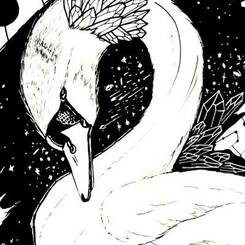 Well these things happen..... at least they do in English Folk Music. On Sunday 3rd March 2019 the wonderful Voces Inauditae will give the world premiere of my choral piece Swansong in Edinburgh. I thought in this blog we could explore the background to the piece.... The piece is based on the British folk song Polly Vaughan. The unfortunate Polly takes a walk by the setting sun and takes shelter among the bushes when the rain starts, pulling her apron over her head. Her boyfriend is simultaneously out hunting "with his dog and his gun" and on seeing what he believes to be a swan in the bushes shoots it dead. Overcome with remorse he runs and tells his father who helpfully tells him he must not leave the country before his trial. Polly appears as a ghost, first to Jimmy reassuring him that she knows it was not his fault and then during the trial to beg her uncle, (the judge) to let "Young Jimmy" go free, insisting they are never going to hang him "for the killing of the swan". This was clearly an unfortunate accident, however one might wonder why Young Jimmy thought shooting a swan was a good idea at all seeing as it has been illegal since at least 1482 (The Act of Swans) and is on record as being frowned upon since 1186. At the very least he would have been imprisoned. It would be good to think that this was an early example of nature conservation but it is generally considered that swans were the preserve of the rich, specifically the reigning monarch, because they tasted good. Anecdotal evidence suggests that they range from being tough, chewy and fishy, to being a bit like goose-flavored venison. Sir Peter Maxwell Davies however suggested it tasted "very dark and rich. It's a bit like pheasant with a hint of venison as well." Sir Peter, a keen environmentalist, said he had called the RSPB after a whooper swan expired near his property. He was advised, he said, to dispose of the bird. "I was under the illusion that it would be all right to eat the best parts, rather than feed them to the cat," he said. (The Guardian 19th March 2005) He was cautioned, but living north of the border thankfully prevented the then Master of the Queen's Music ending up in The Tower! Regarding provenance, Baring-Gould commented that there is some similarity to Celtic legends about "The Swan Maidens” and Roy Palmer recalls the story of the death of Procris in classical antiquity. A more mundane interpretation is that the invention of the rifle inevitably led to an increase in accidents while hunting! Musically the piece, for SATB choir, takes elements of the folk melody and reworks them using spoken word exhorting the audience to "listen" and sustained largely modal chords (in keeping with the folk tradition of the British Isles) but with a distinctly twenty-first century twist supporting the telling of the tale through the different voices. I have combined this with a Latin text, Cycni (13.77) by Martial, a Roman poet from Hispania (modern Spain) best known for his twelve books of Epigrams, published in Rome between AD 86 and 103 Dulcia defecta modulatur carmina lingua cantator cygnus funeris ipse sui. As how to swans, their truth's reward, belong A joyful death, and sweet expiring song. As a folk singer myself, (Polly Vaughan is one of my favourite songs to sing!) I hope I have managed to tell the story adequately. My thanks to Chris Hutchings and Voces Inauditae and all very best wishes for the concert on Sunday...I very much look forward to hearing the recording! Ali
1 Comment
|
Details
AuthorAlison Willis is a composer and musician based in the East of England. Archives
May 2024
Categories |
 RSS Feed
RSS Feed